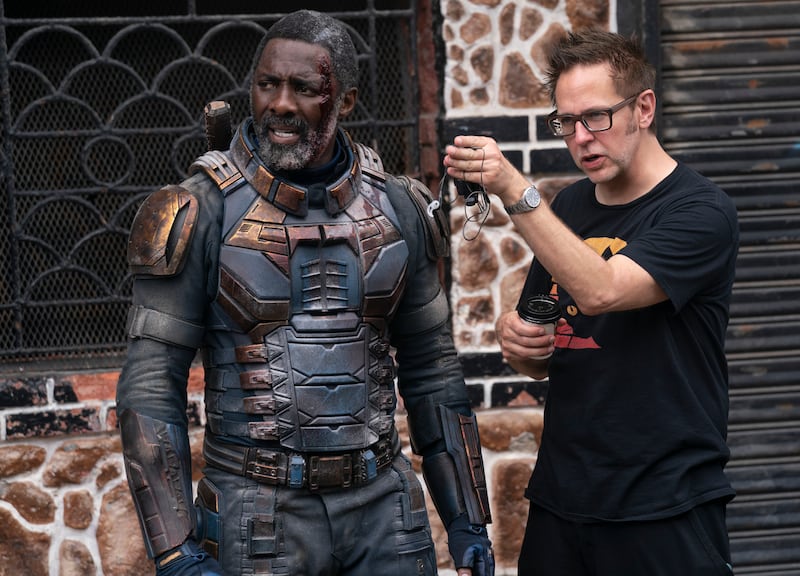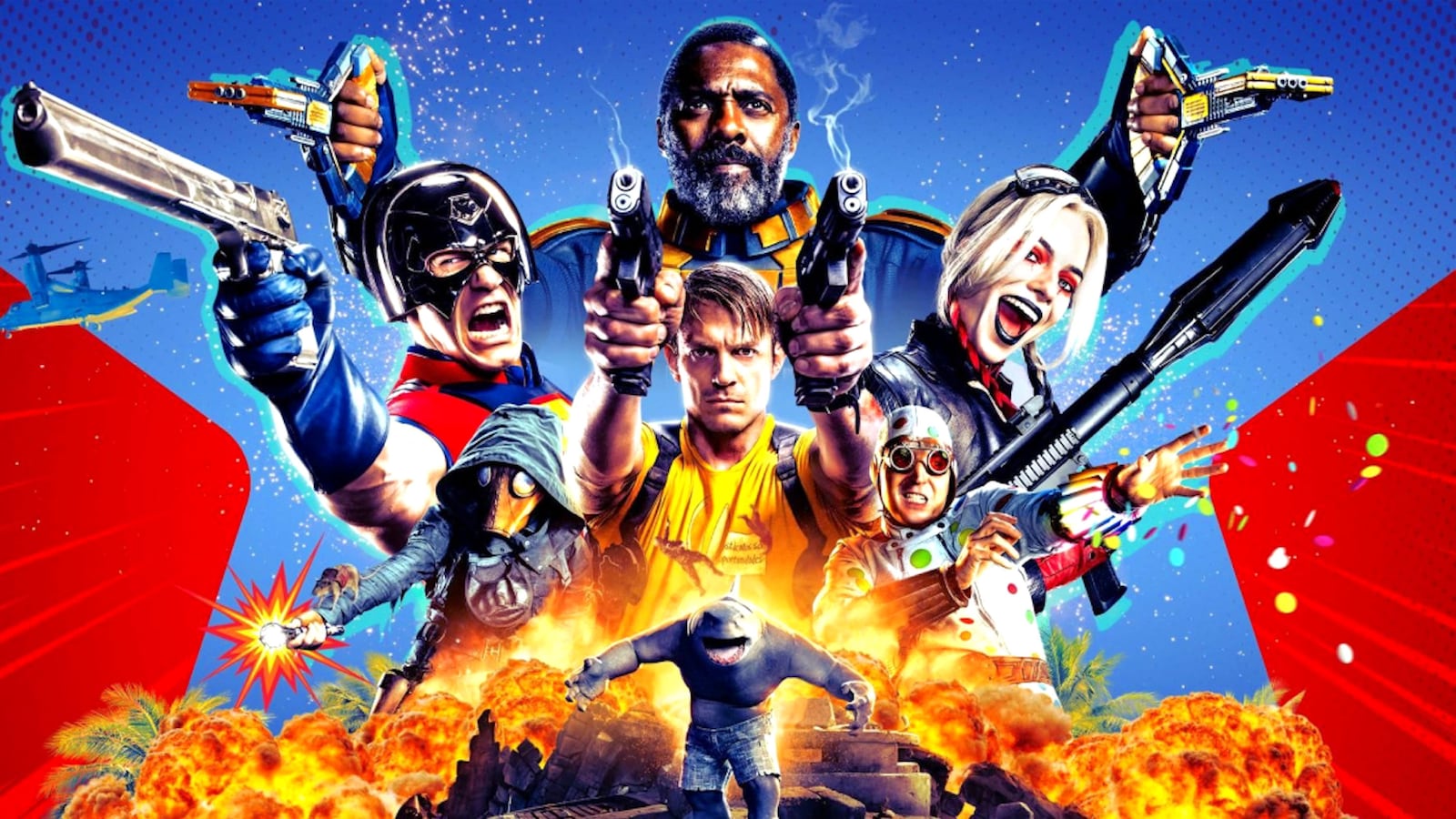It’s hard to describe any of the most moving beats in James Gunn’s The Suicide Squad without sounding a little like a freak. Try to tell a friend unfamiliar with the movie’s bargain-bin roster of antiheroes about the wordless optimism of the rat in the little red vest holding up a pretty leaf. Or the yearning gaze of the stumpy, idiot shark whose loneliness maybe reflects some of your own. Tell them about the profound tragedy of the guy whose superpower is, uh, polka dots. Or the life-affirming triumph of the third-act battle drenched in bodily fluids, sewer rats, and anti-imperialistic fervor.
Bestowing glory on the freaks is one of Gunn’s specialties. It’s what has made the writer-director a natural fit for offbeat superhero storytelling, first with the black comedy Super and most prominently with Marvel’s Guardians of the Galaxy films. That first Guardians movie is still among the best of Marvel’s output, with an enviable, easy irreverence other superhero films are still trying to replicate. It was remarkable for its efficiency, too; by its second act, it managed to not only sharply define each obscure character in its intergalactic grab bag of misfits, but also engendered genuine loyalty and affection among them.
The Suicide Squad, Gunn’s first for DC Films, lacks the cuddly propriety of Marvel’s PG-13 universe—for better and worse. It is unwieldy, uneven, and boasts a mischievous little heart that revels in comically virtuosic gore as much as in poking fun at the bonds and resentments that motivate its characters. Except for pre-established members like Rick Flag (Joel Kinnaman) and Harley Quinn (Margot Robbie), it takes too long to get to know most of Task Force X to care before their faces or limbs suddenly splatter off. (There are 15 or so suicide squadmates at one point; only seven actually matter; some of those still feel like blurs until close to the end of the movie.)
It’s frenetic and ludicrous and a little disjointed, then dampened by a reluctance to commit to its own political ideas. Still, the whole thing is so freewheeling and grotesque that—given you’re the type more prone to laugh than throw up at the sight of raw tendons dangling from both halves of what used to be a grown man—the movie is truly a thrill once it gets going. It’s relentless and funny. And nasty and shocking. And from somewhere within that contrast, it draws out real emotion again and again.
A sequel in name and do-over in practice of 2016’s disastrous Suicide Squad, Gunn’s movie is mainly distinguishable in that it actually has a soul. (See: The rat with the pretty leaf.) Viola Davis returns as Amanda Waller to assemble another team of incarcerated supervillains for a black-ops mission, this time to the island of Corto Maltese, one of DC Comics’ vague proxies for Latin America. Gunn, bless him, speeds through this set-up in minutes, flying through new character introductions in a scramble to get to the first big set piece. You soon realize why: This is the movie’s big mission statement, a deeply bizarre bacchanal of giddy violence and expectations blown to hell.
It’s a satisfying way to wipe the slate clean of the last film’s toxic machismo and self-seriousness. Even Davis gets to ham it up as a villain here, booming through forehead vein-popping screeds and terrorizing a room of white-collar minions. (She at one point also summons the kind of sideways death glare I had not previously thought possible outside of anime. Trailblazer.)
Our core team of seven antiheroes, meanwhile, is a pile of contradictions and embarrassments: Idris Elba’s Bloodsport, who screams “fuck you” at his daughter in an emasculating screaming match then risks his life to keep her safe; John Cena’s Peacemaker, a violently delusional “patriot” who’ll kill innocents to maintain what he defines as peace; David Dastmalchian’s Polka-Dot Man, crippled by mommy issues and a colorful skin condition; King Shark, voiced to adorably dimwitted perfection by Sylvester Stallone; Ratcatcher 2 (Daniela Melchior), a friend only to rodents and the heart of the team; and returning squadmates Rick Flag (Joel Kinnaman) and Harley Quinn (Margot Robbie).
Together, they’re hardly what you’d call a “found family” like the Guardians. Instead they are cutthroat, disgusting, incompetent, and insane. Yet each is so well cast—Dastmalchian, for instance, strikes just the right balance of repellent weirdness and hilarious, deep-rooted sadness. Most command enough individual screen time for us to get to know and root for them. (Rick Flag may be the exception.) Even the monosyllabic King Shark, whose most memorable line is just “nom nom,” is drawn with a relatable set of desires and quirks.
Fans of Quinn’s reinvention in Cathy Yan’s ebullient Birds of Prey will also be relieved that Gunn doesn’t regress the character. The first Suicide Squad may have introduced her as a mere sex object and punching bag, but here Quinn is as deadly, girlish, and daffy as we saw her last. Gunn even echoes some of Yan’s playful visual motifs, sending flowers spurting out of men’s throats in place of blood as Quinn cuts her way through a hallway of prison guards. The standard-issue fight choreography and rapid, incessant cutting can’t compare to the fight scenes in Birds of Prey. But we’re free of both leering, lingering ass shots and Jared Leto’s Joker—a win, let’s call it.
The squad stumbles through the Corto Maltese mission to uncover a weapon being developed in an old Nazi fortress, one which Waller informs them poses a threat to the rest of the world under the island’s new fascistic regime. Slowly, it dawns on them, their mission has come to resemble the U.S.’s real-life interventionism in Latin America—a profiteering, self-serving legacy that has inflicted generations of irreparable damage in the name of American exceptionalism. Gunn gestures at the idea of breaking the cycle and even rallies us against it. It’s a well-meaning and relatively bold stance for a mainstream American superhero movie to assume.

James Gunn directs Idris Elba on the set of The Suicide Squad
Jessica Miglio/Warner Bros.Still, it’s muddled by several factors, not the least of which is the fact that it’s still a bunch of Americans who end up saving the day here. (Alice Braga costars as the leader of a band of rebels intent on freeing the island and holding democratic elections, but there’s little room allotted to them in the story.) When the Suicide Squad uncovers an opportunity to expose the U.S.’s manipulations to the world, they balk and end up shelving it. Roll credits. For a film otherwise so fearless—and so reliant on terror and violence inflicted on this Latin American-coded country—it’s a disappointingly timid step back.
It’s odd to see these newly empowered characters choose to maintain the status quo rather than help destroy the systems that have kept them powerless. The Suicide Squad otherwise takes such care to affirm the purpose and self-determination of even the lowliest creatures, inviting us not only to identify with them, but to be inspired by them. The film’s parting moments center our affection for these characters, dwelling on the triumph of their momentary lurch toward heroism. But maybe the movie just does its job too well. By the end, it’s hard not to want more for the Suicide Squad than just another inevitable round of all this again in a sequel.


